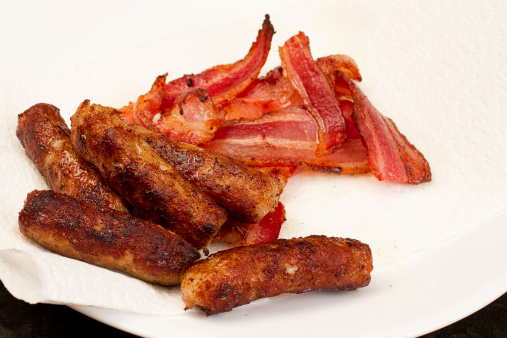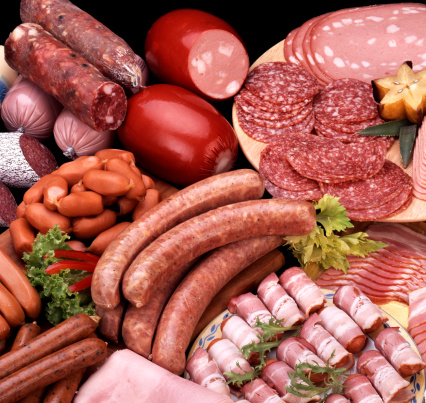Is Breakfast Meat Good for You?

No, this is not a post where I’m going to tell you that bacon and sausage are healthy foods. But, is breakfast meat good for you? The answer may surprise you. While not as healthy as some other breakfast options, like oatmeal or eggs, a small amount of breakfast meat can be a nutritious way to start your day. Breakfast meats are high in protein and B vitamins, which can help give you energy for the day ahead. So, if you’re looking for a quick and easy way to get some protein in the morning, go ahead and have some bacon or sausage – just don’t overdo it!
The nutritional benefits of breakfast meat
While many people have an aversion to breakfast meats because of their high sodium content, it may be a good idea for them to reconsider. A study in the journal Circulation tells us that processed meats can increase a person’s risk for cardiovascular disease and diabetes, but only if they are eaten every day. So, when consumed only occasionally, these meats may not pose much harm to your health. In fact, another study from Harvard University shows that when compared to other sources of protein like chicken or plant-based sources like beans and legumes, bacon and sausage can actually provide more nutritional benefits. In this case, is breakfast meat good for you? The answer is complicated – but in moderation, it could be!
Here are some of the nutritional benefits of breakfast meat:
1. Meat is an excellent source of protein.
Protein helps give you energy and lasts throughout the day. Breakfast meats like bacon or sausages are high in protein, making them a great way to start your day off right.
One slice of bacon contains about 6 grams of protein. A sausage patty provides about 11 grams. This means that, when compared to less processed meats like chicken or beef, breakfast meats are good sources of this important nutrient.
Of course, that doesn’t mean eating a whole pound of bacon every morning is good for you – be reasonable with how much breakfast meat you consume!
2. Meat contains B vitamins.
All types of meat contain small amounts of vitamin B12, but low levels in the diet can lead to anemia and fatigue. Sausage is also a great source of thiamine (vitamin B1), riboflavin (vitamin B2) and niacin (vitamin B3). Vitamin B6 can be found in both pork sausage and bacon, while vitamin B5 is most likely to be found in pork products like ham or pork chops.
3. Meat is a good source of zinc.
Meat, poultry and seafood are some of the best sources of zinc, which is essential for healthy growth and development. Pork sausage provides about 5 percent of your daily value in each 2-ounce serving you eat. Zinc is important for a variety of bodily functions, including cell division and immune function.
4. It can lower LDL cholesterol levels.
According to PubMed Central, eating foods with saturated fat can increase low-density lipoprotein (LDL) cholesterol levels. However, no study exists that shows an association between higher intake of dietary saturated fats and increased risk of coronary heart disease or cardiovascular disease. So, while it’s not recommended that you start adding bacon or sausage to your diet every day just yet, enjoying these meats once in a while will not harm your health. In fact, they may have some nutritional benefits.
5. Red meat is high in iron.
Iron is essential for transporting oxygen throughout the body. It also helps build muscle and keeps you feeling fuller longer, and breakfast meats like bacon and sausage contain a lot of it. A 3-ounce portion of bacon provides more than 50 percent of your daily iron intake.
However, not everyone needs to worry about getting enough iron in their diet – vegetarians and vegans are often at risk for low levels of this nutrient. So, if you’d like to continue eating breakfast meats but aren’t sure how to get the iron you need, grab a glass of tomato juice!
6. Chicken is a low-fat source of protein, zinc, and selenium.
Chicken is a low-fat source of protein that also contains selenium and zinc. As previously mentioned, protein is essential for good health, and zinc can help boost your immune system. Selenium is a mineral that has antioxidant properties. So, when you’re looking for a lean protein that will give you energy and help protect your body from disease, turn to lean cuts of meat like a chicken.
7. Pork chops are a good source of phosphorus, niacin, vitamin B6, and selenium.
Pork is a good source of phosphorus, selenium, thiamin, niacin (vitamin B3), and vitamin B6, all of which are important for maintaining energy levels.
Pork chops provide all of the same nutritional benefits as chicken – they’re just higher in fat! However, if you’re trying to increase your levels of important nutrients like phosphorus and vitamin B6 for better heart health, then pork chops may be of help.
8. Lamb meat is a good source of protein, B vitamins and zinc.
Similar to beef and pork products, lamb meat is a good source of protein as well as B vitamins and zinc. It’s also high in iron, magnesium and phosphorous. All of these nutrients are essential for cell growth and development – so if you enjoy a lamb meal from time to time, it could have some great health benefits.
9. Pork sausage contains high levels of sodium.
Before you add that breakfast meat to your eggs for the ultimate morning meal, read the label! Pork sausage may be high in protein and B vitamins (and low in fat), but it’s also very high in sodium. A 2-ounce serving can have anywhere from 340 milligrams up to 590 milligrams of sodium, so if you’re on a low-sodium diet or watching what you eat for another reason, avoid sausages and bacon at all costs.
10. Meat has some antioxidants.
A small amount of meat every day could provide some protection against heart disease and cancer because it contains certain antioxidants such as selenium and vitamin A. For example, one slice of bacon contains about 8 percent of the daily recommended value of selenium, an antioxidant that helps protect cells from free radicals.
But, while bacon and sausage do have some nutritional benefits, you should limit your intake of these meats to a few times per week in order to stay healthy.
In conclusion, pork-derived meat products can provide extra nutritional benefits – especially if you do not eat red meats or poultry as often as other sources of protein. That doesn’t mean that sausages and bacon should be your go-to breakfast every morning, but adding them into your diet once in a while is perfectly fine! Just don’t overdo it! Pay attention to how much exercise you get each day, make sure you sleep enough hours at night and stay hydrated throughout the day. If you do all of these things and still feel like your body is lacking in some way, then consider adding a pork-derived meat product into your diet every day.
The health risks associated with eating breakfast meat
Are you a fan of breakfast meats like bacon, sausage, and ham? If so, you may be interested to know that eating these foods may come with some health risks.
1. Eating breakfast meats is associated with an increased risk for cardiovascular disease and diabetes.
One major risk associated with eating breakfast meats is an increased risk for cardiovascular disease and diabetes. Why? Well, these meats contain a high amount of sodium – and too much salt can lead to increased blood pressure.
According to a large clinical study published in the British Medical Journal, “…salt intake was significantly associated with higher rates of cardiovascular events, coronary heart disease events, stroke and death from any cause”. This means that the more salt you have in your system, the greater likelihood that you will be at risk for developing some sort of cardiovascular issue or possibly even die from an ailment related to it!
In relation to breakfast meats specifically, another major risk factor is their high amounts of digestible carbohydrates. According to a report published by Harvard University researchers in 2010, diets containing a lot of processed meat increase your risk for type 2 diabetes. The reason for this? These foods are often high in sodium, contain high amounts of saturated fat and digestible carbohydrates – all of which may increase your risk for developing type 2 diabetes.
So, if you’re at high risk for developing either condition – or any other condition that could be worsened by a high intake of sodium – it may be best to avoid these processed meats altogether.
2. High consumption of breakfast meats can lead to gallstones.
The question that we pose is, “are you really eating just one slice of bacon or sausage?” The answer: most likely not! As a result, the high consumption of these processed meats may play a major role in increasing your risk of developing gallstones later on in life. In fact, according to the University of North Carolina School of Researchers found out, people who eat two or more servings per day have an 80% greater chance than others of getting stones! Fat from meat is not the only factor – it’s the high level of cholesterol and saturated fat found in these foods. Unfortunately, leaving them untreated means higher risks of serious complications.
3. Eating breakfast meats may increase your risk for other cancers.
According to the Harvard School of Public Health, eating processed meat can raise your risk for other forms of cancer as well! What other types are we talking about? Stomach, lung and pancreatic cancer – just to name a few! This is because these foods contain high amounts of “N-nitroso compounds.” According to research, this may play a role in increasing your risk anywhere from 34% to 67%, depending on the type you consume.
4. High consumption of processed meats may cause you to feel depressed.
If you’re up for some sad news, then consider this one. According to a study published in the Public Health Nutrition, the journal found that participants who consumed high amounts of processed meats were often more likely to suffer from symptoms of depression than other people. Why? The reason behind this is that these foods are often rich in heme iron – an element that can affect your brain and nervous system by forming free radicals. This, in turn, leads to depressive symptoms such as mood swings and fatigue!
5. Breakfast meats may lead to lower bone density.
According to research conducted at Tufts University Medical Center, the nutrients commonly found in breakfast meats and other sausage products may play a role in decreasing your bone density. This is because they are high in protein, phosphorus, sodium, and saturated fat – all of which have been found to decrease calcium absorption! This lack of calcium can lead to an increased risk of osteoporosis or other conditions related to the skeletal system later on in life.
6. Sausage products may cause blindness.
Guess what… it turns out that processed meats like sausage aren’t very good for our eyes either. According to research conducted at the University of Sydney, Australia, men who eat even just one sausage product per day have a 50% higher chance than others of developing age-related macular degeneration (ARMD), which is often characterized by serious vision loss.
Why? Researchers believe that it has something to do with the high sodium content found in processed meats!
7. High consumption of these foods can increase your risk for kidney failure.
According to research conducted at Harvard Medical School, eating large amounts of processed meat like hot dogs and sausage products may contribute to an increased risk for kidney failure later on in life. However, the cause behind this is not sodium or nitrates; instead, researchers believe that it’s due to the high-fat content present in these products. In another research where processed meat was replaced with legumes and other sources of proteins, it was found that Chronic Kidney Disease (CKD) risk was significantly reduced.
8. High consumption of processed meats may increase your risk for diabetes.
According to research conducted at Harvard School of Public Health, eating processed meats can have a negative impact on blood sugar levels! This is often due to the high-fat content found in sausage products, which can lead to an increased risk of developing type 2 diabetes later on in life.
9. Keeps you from absorbing other nutrients.
The high amount of sodium found in these foods may have another drawback apart from increasing your health risks – it can also keep you from absorbing other healthy nutrients, such as calcium! Not enough proof? Well, according to researchers at Tufts University, people who consumed high amounts of salt had lower levels of vitamin B12, A, E and K than those who consumed small or no amounts of salt at all.
10. Diseases like Parkinson’s may be linked to the consumption of these meats.
According to researchers at Boston University School of Medicine, processed meats like sausage can cause an inflammatory response in your body that can contribute to brain cell death – the same type that is found in individuals with diseases like Parkinson’s! This particular finding was published in the “Cerebral Cortex” journal. However, researchers state that more research must be done for them to establish a causal relationship between processed meat consumption and neurological disorders.
So if you are considering making sausage part of your daily diet… think again! It might not only increase your risk for diseases like cancer, heart disease and high blood pressure; it might even affect you negatively in ways that are still not entirely known!!
How to make a healthy breakfast that includes meat
Think you need to give up meat to have a healthy breakfast? Think again! There are plenty of ways to include protein in your morning meal, and still, make something delicious. Whether you’re looking for ideas for eggs, yogurt or pancakes, we’ve got you covered. So get cooking and start your day off right!
- When choosing which type of processed meat to eat, stick with those lower in fat and salt content
- In general, it is best to be conservative when choosing what types of processed meats to eat. Pork products are very low in fat, especially if you choose lean cuts like Canadian bacon or pork loin chops. Lower-sodium ham is also a great choice. If you really enjoy sausage, look for one that is made with turkey instead of pork. And no matter which type you select, do not eat breakfast meat on an everyday basis.
- For the best nutritional value and greatest variety, look for deli meats made with organic ingredients or free-range chicken. Look for meats that are low in fat and sodium and without nitrates.
- If you really enjoy sausages but want to cut down on the amount of saturated fat that they contain, swap them out with an organic chicken sausage such as this one. And if possible, instead of frying your eggs in butter or oil at breakfast time, try using cooking spray instead. This will help reduce your daily intake of unhealthy fats even more!
- If you are looking to include meat in your breakfast without taking away from the overall health factor of other ingredients, make a quinoa veggie omelet with meat added instead of hash browns for example. And if you’re not sure how to make a good-tasting quinoa omelet, try mixing the quinoa with some veggies first before adding your egg mixture!
- For recipes that call for sausage, consider ground organic chicken or lean turkey. They often taste exactly like their pork counterparts but without the added fat and sodium.
- Avoid using oil or butter when cooking or frying meat.
- As natural foods become more popular with consumers, many brands of breakfast meat have begun offering “natural” products that contain fewer additives than traditional varieties do. These products may provide your body with extra health benefits. If you’re looking for an even healthier choice, look for deli meats that are made with organic ingredients. Since this label indicates that the product was produced without antibiotics or added hormones, it is likely to be healthier for your body.
- If you are after the protein found in meat, you can try other great sources of protein include beans and legumes if you are eating too much meat. Legumes like garbanzo beans also provide a great source of both dietary fibre and protein – but they have much less saturated fat than breakfast meat does! One cup contains about 15 grams of protein, 40 grams of carbs and 15 grams of fibre.
- Yogurt is another great alternative to incorporate in your breakfast. Combine whole-grain cereal or toast with nonfat yogurt, fruit and honey for a healthy start to your day. If you can’t live without meat, try including ready-to-eat turkey sausage links that are lower in fat than traditional breakfast sausages.
So now that you know all the facts about meat (especially processed meats), it’s up to you to decide whether to continue eating them at every meal… or cut back! By making small changes to your diet, like choosing leaner kinds of meat or making them part of an everyday menu less often, you will be on your way towards maintaining good health.
Disclaimer
Before deciding on cutting back or omitting meat from your diet, make sure that your physician or health care provider approves. This article is strictly for informational purposes only, and should not be considered medical advice. The author of this article takes no responsibility for the consequences or repercussions resulting from any information provided within this article or the website where this article appears.






